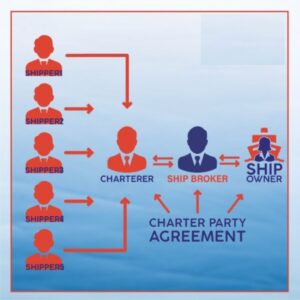Shipowner is a legal entity officially registered as the owner of the ship in a Ship Registry.
Cargo Owner is the owner of the cargo that is required to be shipped.

Chartering is an agreement in which a shipowner agrees to rent out a ship to a cargo owner to move the cargo from Point A to Point B.
Charter Party is the agreement between the shipowner and the cargo owner where the shipowner allows the cargo owner the use and/or management of the vessel in exchange for “freight”.
Charterer is someone who has signed a charter party with the shipowner for the hire of the required ship or a part of the capacity thereof. A charterer may be the actual owner of the cargo, a cargo trading company, someone acting on behalf of the actual cargo owner or someone in the business of hiring ships for trading in cargoes.
While ship charter happens in all types of cargoes, it is PREDOMINANTLY popular in the Bulk (Dry and Wet) and Breakbulk sectors.
A Ship Charterer plans the details of the voyage, including calculation of cargo handling costs up to the ship and depending on the terms of shipments agreed with the shipowner (such as FLT, FIO etc) arrange shore-based cargo handling equipment where required etc.
Basically, everything that is required to ensure not just the safe loading and discharging of the goods, but also the safety of the ship and its crew by following the best practices in cargo operations
Ship charterers could be any of a diverse group of entities such as commodity traders, oil majors, mining companies and grain houses shipping raw materials such as coal, iron ore, bauxite, grain, phosphate and crude oil to highly refined products such as aviation fuel and petrochemicals.
As per global trade estimates in 2017, more than 10.702 billion tons of cargo were shipped over 58 trillion ton-miles on 50,732 ships across the globe. Out of this, if we take out the container ships, around 44,000 ships were involved in carrying Oil, Dry Bulk, General Purpose, Gas etc.
You can imagine then, that the cargo owners who have the cargo do not know all the owners of the 44,000 ships that are available to carry their cargo.
The Shipbroker
While the shipbroker also will not know the owners of all 44,000 ships, there are several shipbrokers and broking companies around the world and it is their job to bring the shipowners and charterers together.
A shipbroker brings the shipowners and charterers together and facilitates the charter.
Once an agreement is reached between the parties as per the charter party, it is called a fixture.
Read Also: Seafarers Call For Unification, Advocate Central Professional Coordination Bill
The broker(s) involved in the fixture receives a commission on the gross freight or hire earned by the shipowner.
The commission is usually a percentage of the freight and this is paid by the shipowner to the shipbroker.
A shipbroker maybe part of a shipbroking department in the principal’s own organization, or part of a separate company within which individual brokers tend to specialist as owner’s or charterer’s brokers.
There can also be an extended ‘chain’ of brokers (occasionally only one) between the two principals.
A ship operator is either the shipowner or the (legal) person responsible for the actual management of the vessel and its crew.
A shipbroker performs several functions and must be aware of the various types of charters involved depending on the cargo type.
The main types of charters are:
• Time Charter
• Voyage Charter
• Bareboat Charter
Kindly like us on Facebook















